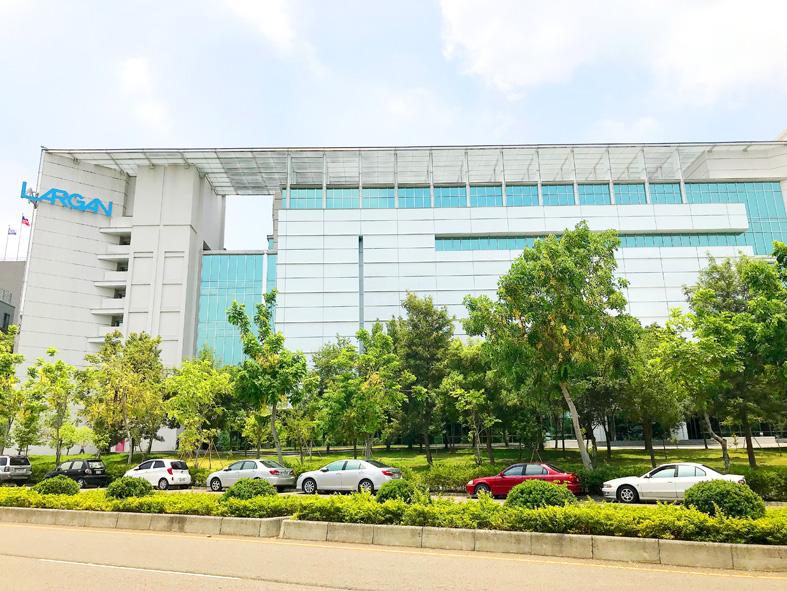Last month’s revenue at Largan Precision Co (大立光) was the highest the smartphone camera lens supplier had posted in 10 months and marks the sixth consecutive month of growth, the company said yesterday.
Consolidated revenue rose 3.54 percent month-on-month to NT$4.35 billion (US$156.9 million), the highest since January, when the company posted NT$4.61 billion in revenue, Largan data showed.
The results reflected that the firm was ramping up production as the industry enters its peak season and customers launch new models.

Photo: Chen Mei-ying, Taipei Times
However, last month’s figure was 16.94 percent lower than the NT$5.24 billion it posted a year earlier, as component shortages and continued effects of the COVID-19 pandemic prompted smartphone brands to postpone camera upgrades, Largan said.
Analysts said that the company’s Chinese clients remained unable to make up for the loss of orders from Huawei Technologies Co (華為), which is affected by US sanctions that also influenced Largan’s average selling prices and shipping volume.
Taichung-based Largan counts Apple Inc, Sony Corp and Samsung Electronics Inc among its customers.
High-margin lenses for cameras of 20 or more megapixels accounted for 10 to 20 percent of its total shipments last month, lenses for products of 10 megapixels or more contributed 50 to 60 percent, lenses for 8-megapixel products made up 10 percent and other lenses for products with lower resolutions contributed 20 to 30 percent, Largan’s shipment breakdown showed.
As a leading maker of optical lens modules, Largan also produces real-image viewfinders and other optoelectronic parts.
The company’s cumulative revenue for the first 11 months of this year dropped 16.79 percent year-on-year to NT$42.46 billion.
Largan remains a leader in the lens industry, but the overall smartphone supply chains are still facing uncertainties amid tight supply for some components and the lingering pandemic in the near term, analysts said.
For this quarter, Largan’s revenue is forecast to grow 9 percent quarter-on-quarter, but fall 15 percent year-on-year to NT$13 billion, due mainly to its US clients losing market share, price pressure and weaker demand from Android-based smartphone brands, Yuanta Securities Investment Consulting Co (元大投顧) said in a research note last month.
Due to slowing specification upgrades, rising competition from rivals and continued pressure on its gross margin, Largan shares have declined 37.56 percent so far this year.
The shares closed 0.99 percent lower at NT$1,995 on Friday in Taipei trading, Taiwan Stock Exchange data showed.
Largan’s board of directors on Oct. 25 approved the company’s first buyback program for two months, aiming to buy back up to 1.342 million shares — or 1 percent of its outstanding shares — on the open market from Oct. 26 to Dec. 24 at NT$2,025 to NT$3,300 per share.
The company has thus far repurchased 580,000 shares for NT$2,090 on average, spending a total of NT$1.21 billion, its regulatory filings showed.

South Korea’s equity benchmark yesterday crossed a new milestone just a month after surpassing the once-unthinkable 5,000 mark as surging global memory demand powers the country’s biggest chipmakers. The KOSPI advanced as much as 2.6 percent to a record 6,123, with Samsung Electronics Co and SK Hynix Inc each gaining more than 2 percent. With the benchmark now up 45 percent this year, South Korea’s stock market capitalization has also moved past France’s, following last month’s overtaking of Germany’s. Long overlooked by foreign funds, despite being undervalued, South Korean stocks have now emerged as clear winners in the global market. The so-called “artificial intelligence

NEW IDENTITY: Known for its software, India has expanded into hardware, with its semiconductor industry growing from US$38bn in 2023 to US$45bn to US$50bn India on Saturday inaugurated its first semiconductor assembly and test facility, a milestone in the government’s push to reduce dependence on foreign chipmakers and stake a claim in a sector dominated by China. Indian Prime Minister Narendra Modi opened US firm Micron Technology Inc’s semiconductor assembly, test and packaging unit in his home state of Gujarat, hailing the “dawn of a new era” for India’s technology ambitions. “When young Indians look back in the future, they will see this decade as the turning point in our tech future,” Modi told the event, which was broadcast on his YouTube channel. The plant would convert

‘SEISMIC SHIFT’: The researcher forecast there would be about 1.1 billion mobile shipments this year, down from 1.26 billion the prior year and erasing years of gains The global smartphone market is expected to contract 12.9 percent this year due to the unprecedented memorychip shortage, marking “a crisis like no other,” researcher International Data Corp (IDC) said. The new forecast, a dramatic revision down from earlier estimates, gives the latest accounting of the ongoing memory crunch that is affecting every corner of the electronics industry. The demand for advanced memory to power artificial intelligence (AI) tasks has drained global supply until well into next year and jeopardizes the business model of many smartphone makers. IDC forecast about 1.1 billion mobile shipments this year, down from 1.26 billion the prior

People stand in a Pokemon store in Tokyo on Thursday. One of the world highest-grossing franchises is celebrated its 30th anniversary yesterday.